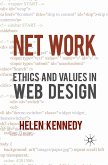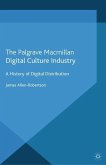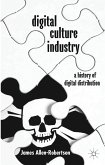'With rigor and heart, Helen Kennedy demonstrates that ethical decisions are interwoven into the labor of web design, making the work meaningful for designers and the internet more accessible for users. She successfully balances a critical yet hopeful tone in theorizing cultural labor in the new economy.' - Vicki Mayer, Tulane University, USA
'Beautifully written and carefully researched, this is an important book that makes a major contribution to thinking about labour, ethics and new media.'
- Rosalind Gill, King's College London, UK
'Helen Kennedy has painted a detailed moral and emotional landscape of the web: beginning from its inception as a space founded upon principles of freedom, through the emergence of professional practices surrounding it, to the standards that now underpin making the web accessible to all. The book offers an alternative way of reading the hope and utopianism associated with the Internet in the 1990s. While many critical Socio-Technical Studies (STS) theorists perceived it as a collective technologically determined delusion that conveniently ignored ingrained inequalities, Kennedy argues that these affective beginnings were the basis for an industry founded upon ethical principles that subsequently attracts ethically motivated labourers. For web professionals, the book inspires some reflective thinking about why we were drawn to our industry and the ways we work in it. For students and teachers of digital media, it provides a much needed philosophical framework for web industry practice.'
- Linda Leung, University of Technology Sydney, Australia
'Beautifully written and carefully researched, this is an important book that makes a major contribution to thinking about labour, ethics and new media.'
- Rosalind Gill, King's College London, UK
'Helen Kennedy has painted a detailed moral and emotional landscape of the web: beginning from its inception as a space founded upon principles of freedom, through the emergence of professional practices surrounding it, to the standards that now underpin making the web accessible to all. The book offers an alternative way of reading the hope and utopianism associated with the Internet in the 1990s. While many critical Socio-Technical Studies (STS) theorists perceived it as a collective technologically determined delusion that conveniently ignored ingrained inequalities, Kennedy argues that these affective beginnings were the basis for an industry founded upon ethical principles that subsequently attracts ethically motivated labourers. For web professionals, the book inspires some reflective thinking about why we were drawn to our industry and the ways we work in it. For students and teachers of digital media, it provides a much needed philosophical framework for web industry practice.'
- Linda Leung, University of Technology Sydney, Australia








